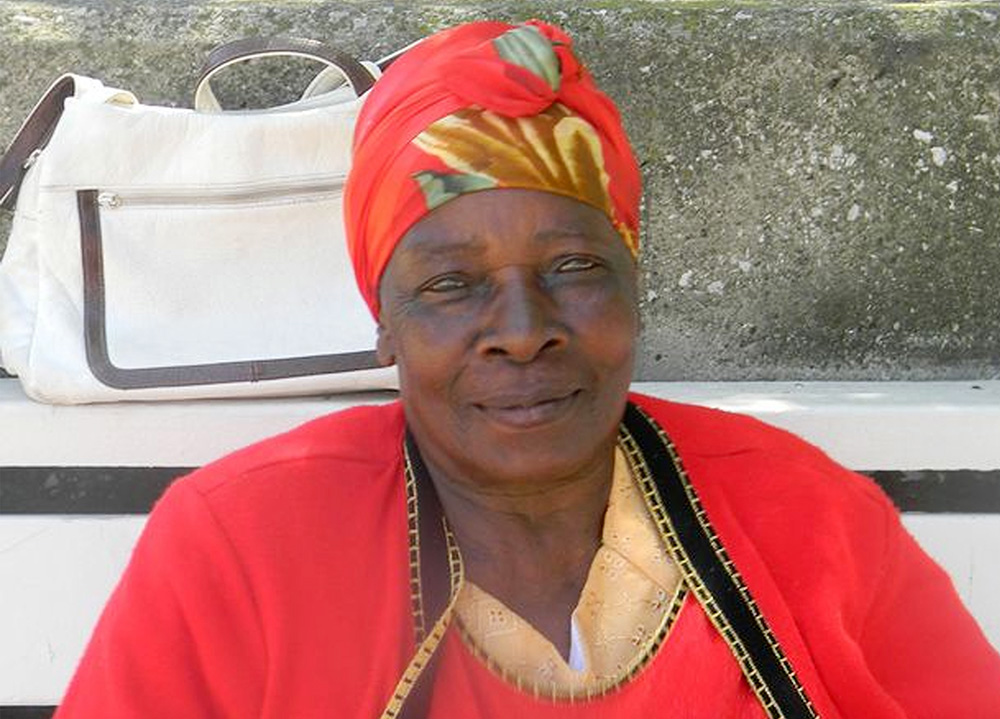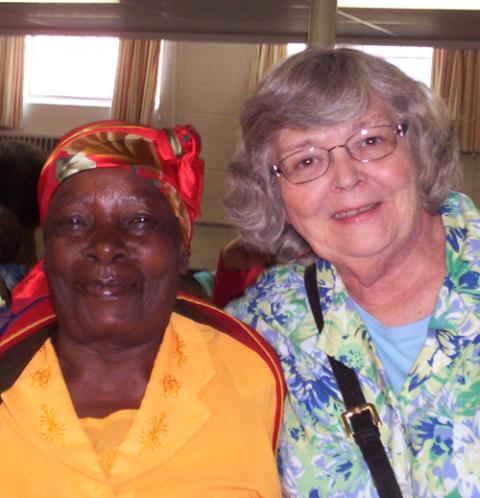
Penina: Sharing a meal, a little dance now and then, a warm welcome, offering what you have with a generous spirit — this is the language that served us well. (Courtesy of Margaret Cessna)
My caller ID said it was Alexis. "Peg. My mother-in-law died. Penina is dead." It felt like a kick in the stomach.
Fifteen years ago, I volunteered as a family mentor for Catholic Charities Refugee Services. Alexis, his wife, five children and mother-in-law Penina were my first family. The family was Hutu; they had escaped the oppression of the Tutsi gangs in their homeland of Burundi to find safety in a refugee camp in Tanzania. Through the United Nations, the U.S. State Department and Catholic Charities, they were resettled in Cleveland.
I was most fortunate to be assigned as a mentor to this family, a family that has blessed me with their courage and their warmth, with their trust and their friendship.
I visited them several times each week as they learned ways to adapt to life in their new homeland. Once they were settled, I moved on to my next family, but I have continued to visit them every year since on a regular basis. I always took a treat for the whole family, but Penina got her own little bag: chocolate, cookies or her favorite, an orange.
Because of COVID-19, I had not seen them for a while and I did not even know that Panina was sick.
Anyone who really knows me knows that I don't sing or dance. I can do a lot of things. But sing and dance? No. Until Penina saw me coming.
Advertisement
With her arms wide open in greeting, she would sway and sashay toward me in a most elegant manner right into a warm hug and while we were at it, a few little dance steps as we held each other in the universal language of friendship. What was I to do? Of course I would sway and sashay right into her arms in response. Not elegant, I admit. But it felt so good to return her greeting in that way.
Penina is dead. I did not get to say goodbye. I did not get to thank her for all that she meant to me.
Penina knew I would do anything for her. She spoke so fast to me in Kirundi as though I understood every word. I didn't understand any of her words but her gestures were another matter.
A groan and a hand on her knee told me that her arthritis was acting up. She needs some Advil. An open mouth and a whimper let me know that she needs to go to the dentist. A sway and a sashay tell me that she is glad to see me. She holds out a portion of cooked cornmeal and points. I take the offering, dip it into the tasty gravy and smile my appreciation for her native cuisine.
We talked to each other all of the time that way, sharing the universal language of welcome and friendship.
So it took no thought or effort on my part to take off my socks on a chilly, rainy fall day so that Penina's feet that were so used to African warmth would no longer be bare. Her 11-year-old grandson translated for her that day when I visited. "She wants to know if you will get her some socks," he said to me. I took her a full pack of new socks the next day, but until then her feet were warm.

Penina and Humility of Mary Sr. Margaret Cessna at a high school graduation party for one of Penina's grandsons (Courtesy of Margaret Cessna)
After her 15 years in Cleveland, I think Panina must have understood English. But she never let on and I never questioned her.
She carried a white plastic purse whenever she left the house. Her papers that told where she came from and why she was here were the only contents. She was proud of those papers. I could tell by the way she carried the purse. By the way she would hold it open so that I could get a glimpse of the treasures that she cherished.
Sometimes, I would think of my own immigrant grandmother when I would see her. They do not seem to be much alike, but in the long run, I guess there is not much difference between corned beef and goat meat. Not much difference in gratitude for a new home. Not much difference in the homesick moments when families from far away are missed with a certain, deep longing.
Although — like me — my grandma did not dance, I suppose there is not much difference between sashaying into a warm Burundi embrace and leaning into a good old Irish hug.
And by the way, I would gladly trade a pair of socks for a bit of cornmeal dipped in tasty gravy any day of the week. More than a bargain. A reminder of friendship that is pure gift.
Sharing a meal, a little dance now and then, a warm welcome, offering what you have with a generous spirit — this is the language that served us well. A universal language. A warm language. A language of the heart.
Thank you, my friend. Thank you for your grace, beauty and dignity. For your deep affection.
I will never, ever forget you.





